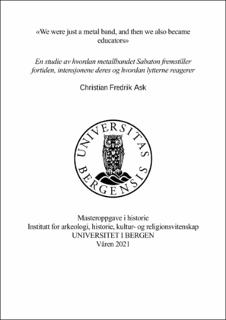«We were just a metal band, and then we also became educators»: En studie av hvordan metallbandet Sabaton fremstiller fortiden, intensjonene deres og hvordan lytterne reagerer
Master thesis
Permanent lenke
https://hdl.handle.net/11250/2763234Utgivelsesdato
2021-06-16Metadata
Vis full innførselSamlinger
- Master theses [207]
Sammendrag
This thesis is a study on how the Swedish metal band Sabaton conveys the past in their music, their intentions and messaging in their songs, and how listeners respond to this. This is done by analysing a selection of their songs based on three different separated themes, by using Philippe Carrard’s “minimalistic narratives” term to find out what story is conveyed by the lyrics, and what kind of moral or political message can be interpreted from it. The band’s intentions are interpreted by analysing statements made by the band’s frontmen, Joakim Brodén and Pär Sundström. The response of the listeners is gathered by analysing comment sections on YouTube videos of both official and unofficial videos of the band’s music. In general, Sabaton portray the past to entertain their listeners. Their intentions for doing so are largely commercial. For the listeners, Sabaton’s music fulfils other uses for historical functions than just entertainment: it has existential, scientific, legitimising and identity-creating functions. Sabaton’s music allows the listeners to immerse themselves in the past.
